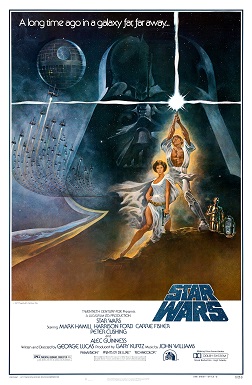Star Wars (film)
1977 American epic space opera film directed by George Lucas
Star Wars, later retitled Star Wars: Episode IV – A New Hope, is a 1977 American epic space opera film written and directed by George Lucas. It is the first film in the original Star Wars trilogy and the beginning of the Star Wars franchise. The film stars Mark Hamill, Harrison Ford, Carrie Fisher, Peter Cushing, and Alec Guinness. The story is set "a long time ago in a galaxy far, far away" and follows a group of rebels led by Princess Leia (Fisher) as they attempt to destroy the Death Star, a massive space station capable of destroying planets.
Plot[edit | edit source]
The film opens with the Galactic Empire's forces, led by Darth Vader, capturing Princess Leia's starship. Before her capture, Leia hides the plans for the Death Star in the memory of an astromech droid named R2-D2, who, along with protocol droid C-3PO, escapes to the desert planet Tatooine. The droids are found by a young farmer named Luke Skywalker, who discovers Leia's message hidden within R2-D2. The message is a plea for help from Obi-Wan Kenobi, a former Jedi Knight.
Luke and the droids find Obi-Wan, who reveals that he knew Luke's father, Anakin Skywalker, and that Luke must learn the ways of the Force to become a Jedi. They hire smuggler Han Solo and his co-pilot Chewbacca to transport them to the planet Alderaan, only to find it destroyed by the Death Star. The group is captured by the Death Star's tractor beam but manages to rescue Leia and escape after a confrontation with Darth Vader.
Cast[edit | edit source]
- Mark Hamill as Luke Skywalker
- Harrison Ford as Han Solo
- Carrie Fisher as Princess Leia
- Peter Cushing as Grand Moff Tarkin
- Alec Guinness as Obi-Wan Kenobi
- Anthony Daniels as C-3PO
- Kenny Baker as R2-D2
- David Prowse as Darth Vader (body)
- James Earl Jones as Darth Vader (voice)
- Peter Mayhew as Chewbacca
Production[edit | edit source]
The film was produced by Lucasfilm and distributed by 20th Century Fox. Principal photography began on March 22, 1976, and concluded on July 16, 1976. Filming took place in various locations, including Tunisia for the Tatooine scenes and Elstree Studios in England for interior shots.
Music[edit | edit source]
The iconic score for Star Wars was composed by John Williams, who conducted the London Symphony Orchestra. The soundtrack includes the famous "Main Title" theme, which has become one of the most recognizable pieces of film music.
Release and Reception[edit | edit source]
Star Wars was released on May 25, 1977, and became a massive success, both critically and commercially. It grossed over $775 million worldwide and won six Academy Awards. The film's success led to two sequels, The Empire Strikes Back (1980) and Return of the Jedi (1983), as well as a prequel trilogy and a sequel trilogy.
Legacy[edit | edit source]
Star Wars has had a significant impact on popular culture and has spawned an extensive media franchise, including television series, books, comics, video games, and merchandise. The film is often credited with revolutionizing the science fiction genre and the film industry as a whole.
Related Pages[edit | edit source]
- Star Wars trilogy
- The Empire Strikes Back
- Return of the Jedi
- George Lucas
- John Williams
- Lucasfilm
- 20th Century Fox
Search WikiMD
Ad.Tired of being Overweight? Try W8MD's physician weight loss program.
Semaglutide (Ozempic / Wegovy and Tirzepatide (Mounjaro / Zepbound) available.
Advertise on WikiMD
|
WikiMD's Wellness Encyclopedia |
| Let Food Be Thy Medicine Medicine Thy Food - Hippocrates |
Translate this page: - East Asian
中文,
日本,
한국어,
South Asian
हिन्दी,
தமிழ்,
తెలుగు,
Urdu,
ಕನ್ನಡ,
Southeast Asian
Indonesian,
Vietnamese,
Thai,
မြန်မာဘာသာ,
বাংলা
European
español,
Deutsch,
français,
Greek,
português do Brasil,
polski,
română,
русский,
Nederlands,
norsk,
svenska,
suomi,
Italian
Middle Eastern & African
عربى,
Turkish,
Persian,
Hebrew,
Afrikaans,
isiZulu,
Kiswahili,
Other
Bulgarian,
Hungarian,
Czech,
Swedish,
മലയാളം,
मराठी,
ਪੰਜਾਬੀ,
ગુજરાતી,
Portuguese,
Ukrainian
Medical Disclaimer: WikiMD is not a substitute for professional medical advice. The information on WikiMD is provided as an information resource only, may be incorrect, outdated or misleading, and is not to be used or relied on for any diagnostic or treatment purposes. Please consult your health care provider before making any healthcare decisions or for guidance about a specific medical condition. WikiMD expressly disclaims responsibility, and shall have no liability, for any damages, loss, injury, or liability whatsoever suffered as a result of your reliance on the information contained in this site. By visiting this site you agree to the foregoing terms and conditions, which may from time to time be changed or supplemented by WikiMD. If you do not agree to the foregoing terms and conditions, you should not enter or use this site. See full disclaimer.
Credits:Most images are courtesy of Wikimedia commons, and templates, categories Wikipedia, licensed under CC BY SA or similar.
Contributors: Prab R. Tumpati, MD







